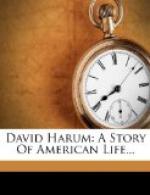CHAPTER XLVII.
How John Lenox tried to kill time during the following two months, and how time retaliated during the process, it is needless to set forth. It may not, however, be wholly irrelevant to note that his cough had gradually disappeared, and that his appetite had become good enough to carry him through the average table d’hote dinner. On the morning after his arrival at Naples he found a cable dispatch at the office of Cook & Son, as follows: “Sixty cash, forty stock. Stock good. Harum.”
“God bless the dear old boy!” said John fervently. The Pennsylvania property was sold at last; and if “stock good” was true, the dispatch informed him that he was, if not a rich man for modern days, still, as David would have put it, “wuth consid’able.” No man, I take it, is very likely to receive such a piece of news without satisfaction; but if our friend’s first sensation was one of gratification, the thought which followed had a drop of bitterness in it. “If I could only have had it before!” he said to himself; and indeed many of the disappointments of life, if not the greater part, come because events are unpunctual. They have a way of arriving sometimes too early, or worse, too late.
Another circumstance detracted from his satisfaction: a note he expected did not appear among the other communications waiting him at the bankers, and his mind was occupied for the while with various conjectures as to the reason, none of which was satisfactory. Perhaps she had changed her mind. Perhaps—a score of things! Well, there was nothing for it but to be as patient as possible and await events. He remembered that she had said she was to visit some friends by the name of Hartleigh, and she had told him the name of their villa, but for the moment he did not remember it. In any case he did not know the Hartleighs, and if she had changed her mind—as was possibly indicated by the omission to send him word—well——! He shrugged his shoulders, mechanically lighted a cigarette, and strolled down and out of the Piazza Martiri and across to the Largo della Vittoria. He had a half-formed idea of walking back through the Villa Nazionale, spending an hour at the Aquarium, and then to his hotel for luncheon. It occurred to him at the moment that there was a steamer from Genoa on the Monday following, that he was tired of wandering about aimlessly and alone, and that there was really no reason why he should not take the said steamer and go home. Occupied with these reflections, he absently observed, just opposite to him across the way, a pair of large bay horses in front of a handsome landau. A coachman in livery was on the box, and a small footman, very much coated and silk-hatted, was standing about; and, as he looked, two ladies came out of the arched entrance to the court of the building before which the equipage was halted, and the small footman sprang to the carriage door.




